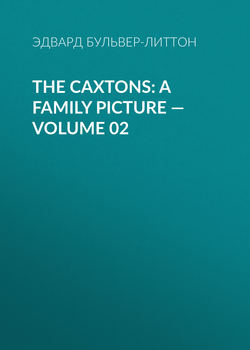The Caxtons: A Family Picture — Volume 02

Реклама. ООО «ЛитРес», ИНН: 7719571260.
Оглавление
Эдвард Бульвер-Литтон. The Caxtons: A Family Picture — Volume 02
PART II
CHAPTER I
CHAPTER II
CHAPTER III
CHAPTER IV
CHAPTER V
Отрывок из книги
When I had reached the age of twelve, I had got to the head of the preparatory school to which I had been sent. And having thus exhausted all the oxygen of learning in that little receiver, my parents looked out for a wider range for my inspirations. During the last two years in which I had been at school, my love for study had returned; but it was a vigorous, wakeful, undreamy love, stimulated by competition, and animated by the practical desire to excel.
My father no longer sought to curb my intellectual aspirings. He had too great a reverence for scholarship not to wish me to become a scholar if possible; though he more than once said to me somewhat sadly, "Master books, but do not let them master you. Read to live, not live to read. One slave of the lamp is enough for a household; my servitude must not be a hereditary bondage."
.....
Dr. Herman had written a great many learned works against every pre- existing method of instruction; that which had made the greatest noise was upon the infamous fiction of Spelling-Books: "A more lying, roundabout, puzzle-headed delusion than that by which we Confuse the clear instincts of truth in our accursed systems of spelling, was never concocted by the father of falsehood." Such was the exordium of this famous treatise. "For instance, take the monosyllable Cat. What a brazen forehead you must have when you say to an infant, c, a, t,—spell Cat: that is, three sounds, forming a totally opposite compound,— opposite in every detail, opposite in the whole,—compose a poor little monosyllable which, if you would but say the simple truth, the child will learn to spell merely by looking at it! How can three sounds, which run thus to the ear, see-eh-tee, compose the sound cat? Don't they rather compose the sound see-eh-te, or ceaty? How can a system of education flourish that begins by so monstrous a falsehood, which the sense of hearing suffices to contradict? No wonder that the horn-book is the despair of mothers! "From this instance the reader will perceive that Dr. Herman, in his theory of education, began at the beginning,—he took the bull fairly by the horns. As for the rest, upon a broad principle of eclecticism, he had combined together every new patent invention for youthful idea-shooting. He had taken his trigger from Hofwyl; he had bought his wadding from Hamilton; he had got his copper- caps from Bell and Lancaster. The youthful idea,—he had rammed it tight! he had rammed it loose! he had rammed it with pictorial illustrations! he had rammed it with the monitorial system! he had rammed it in every conceivable way, and with every imaginable ramrod! but I have mournful doubts whether he shot the youthful idea an inch farther than it did under the old mechanism of flint and steel! Nevertheless, as Dr. Herman really did teach a great many things too much neglected at schools; as, besides Latin and Greek, he taught a vast variety in that vague infinite nowadays called "useful knowledge;" as he engaged lecturers on chemistry, engineering, and natural history; as arithmetic and the elements of physical science were enforced with zeal and care; as all sorts of gymnastics were intermingled with the sports of the playground,—so the youthful idea, if it did not go farther, spread its shots in a wider direction, and a boy could not stay there five years without learning something: which is more than can be said of all schools! He learned at least to use his eyes and his ears and his limbs; order, cleanliness, exercise, grew into habits; and the school pleased the ladies and satisfied the gentlemen,—in a word, it thrived; and Dr. Herman, at the time I speak of, numbered more than one hundred pupils. Now, when the worthy man first commenced the task of tuition, he had proclaimed the humanest abhorrence to the barbarous system of corporal punishment. But alas! as his school increased in numbers, he had proportionately recanted these honorable and anti-birchen ideas. He had—reluctantly, perhaps, honestly, no doubt; but with full determination—come to the conclusion that there are secret springs which can only be detected by the twigs of the divining-rod; and having discovered with what comparative ease the whole mechanism of his little government could be carried on by the admission of the birch-regulator, so, as he grew richer and lazier and fatter, the Philhellenic Institute spun along as glibly as a top kept in vivacious movement by the perpetual application of the lash.
I believe that the school did not suffer in reputation from this sad apostasy on the part of the head-master; on the contrary, it seemed more natural and English,—less outlandish and heretical. And it was at the zenith of its renown when, one bright morning, with all my clothes nicely mended, and a large plum-cake in my box, I was deposited at its hospitable gates.
.....